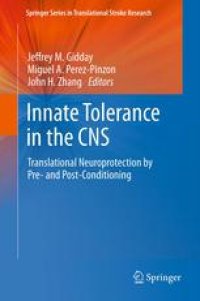
Ebook: Innate Tolerance in the CNS: Translational Neuroprotection by Pre- and Post-Conditioning
- Tags: Neurosciences, Neurology, Neurobiology
- Series: Springer Series in Translational Stroke Research
- Year: 2013
- Publisher: Springer-Verlag New York
- Edition: 1
- Language: English
- pdf
Cerebral preconditioning is a phenomenon wherein a mild insult or stress induces cellular and tissue adaptation or tolerance to a later, severe injury, therefore reflecting the efficacy of endogenous mechanisms of cerebrovascular protection. Initially identified for rapid cardiac protection, preconditioning has expanded to all aspects of CNS protection from ischemia, trauma and potentially neurodegeneration. Many different stimuli or stressors have been identified as preconditioning agents, suggesting a downstream convergence of mechanisms and underscoring the potential for translational application of preconditioning in the clinic. Moreover, the fundamental mechanisms responsible for preconditioning-induced tolerance will help in the design novel pharmacological approaches for neuroprotection. While stroke and many other brain injuries are not predictable, in some populations (e.g., metabolic syndrome, patients undergoing carotid endarterectomy, aneurysm clipping, or with recent TIAs) the risk for stroke is identifiable and significant, and preconditioning may represent a useful strategy for neuroprotection. For unpredictable injuries, post-conditioning the brain – or inducing endogenous protective mechanisms after the initial injury – can also abrogate the extent of injury. Finally, remote pre- and post-conditioning methods have been developed in animals, and are now being tested in clinical trials, wherein a brief, noninjurious stress to a noncerebral tissue (i.e., skeletal muscle) can provide protection to the CNS and thereby allows clinicians the opportunity to circumvent concerns regarding the direct preconditioning of neurological tissues.
Cerebral ischemia from cardiac arrest, stroke, and subarachnoid and intracerebral hemorrhage, together with trauma, epilepsy, and other CNS pathologies, continue to impose immense burdens of morbidity and mortality the world over. Despite many decades of research aimed at understanding the genetic and molecular basis of these pathologies, therapeutics developed on the basis of blocking ‘known’ injury mechanisms can actually claim few clinical successes. The field of CNS “preconditioning” was born from the preclinical finding more than 20 years ago that intentional activation of innate, cytoprotective factors could provide robust protection, or “tolerance” against cerebral ischemic injury.
Herein, up-to-date summaries on all aspects of preconditioning for CNS disease, including the emerging topics of postconditioning and remote pre- and post-conditioning, are provided by the leading scientists in the field. The translational potential of both preclinical and clinical advances is underscored throughout, with the hope of accelerating the bench-to-bedside success of endogenous cytoprotection as a therapeutic strategy.
Jeffrey M. Gidday PhD, Associate Professor of Neurosurgery at Washington University School of Medicine, has been working in the field of CNS preconditioning for 18 years, and has numerous publications on preconditioning-induced protection in the setting of several different cerebral and retinal pathologies.
Miguel A. Perez-Pinzon PhD is Professor of Neurology/Neuroscience, Vice-Chair for Basic Science of Neurology at the University of Miami Miller School of Medicine. He began studies of ischemic preconditioning in 1995 and for many years prior to that worked in the field of anoxia tolerance, publishing close to 50 peer-reviewed articles and many book chapters on these topics.
John H. Zhang MD PhD is Professor of Neurosurgery, Anesthesiology, and Physiology, and Vice-Chair of the Basic Science Department at the Loma Linda University School of Medicine. His research interests include stroke and medical gases, and he has published papers related to pre-, post- and remote-conditioning in subarachnoid hemorrhage, focal cerebral ischemia, and neonatal brain injury.